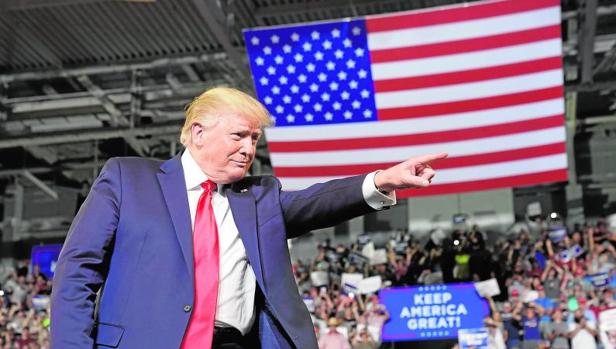
A year before the previous presidential election, Donald
Trump made his way into the GOP primaries with a low-cost campaign that
employed 19 people and operated from an office in his New York skyscraper. Four years later, the current
president has in place the most formidable and well-oiled re-election machinery
in the recent history of American politics.
Trump
wants nothing to do, and so far this year he has already raised $308 million
[276 million] in donations, which has allowed him to hire more than 200 people
and rent a huge headquarters just three kilometers from the White House. (Part
of the campaign's headquarters remain in New York's Trump Tower.) The president
is not wasting his time, and so far this year he has already held 15 rallies in
12 states. He's got another one in Kentucky on Monday.
When Trump
managed to win the nomination in July 2016, he did so after spending $63
million, a ridiculous figure compared to his opponents and predecessors. This
time, when there are still eight months left for Congress in which the
Democratic Party will elect its candidate, the president, who has no real
opposition in the primaries, has spent a whopping 531 million, a good deal on
radio advertisements, television and social media.
The
Shadow of the Impeachment
There
are few dangers Trump faces in his re-election. Most importantly, he will in
all likelihood be the first president in history to campaign after being
recused in the impeachment process, as Democrats have the votes to do so in the
Capitol's lower house.
It's
still to be seen what happens to the impeachment in the Senate, where
Republicans are a majority. Trump's very few critics in his party are on that
camera, and none of them have an electoral pull. Following the death last year
of Sen. John McCain (losing candidate for the presidency in 2008) the GOP
president's main detractor is Mitt Romney (losing candidate for the presidency
in 2012).
Without
internal dissent, Trump won't even have to take the trouble to go to primaries.
So far, the Republican Party has canceled the primaries in Kansas, South
Carolina, Nevada, Arizona and Alaska. The rest resist that he does not an ugly
one to the three candidates who have announced that he will be contesting the
nomination for Trump: former Deputy and former South Carolina Governor Mark
Sanford; Former Illinois Deputy Joe Walsh, and former Massachusetts Gov. Bill
Weld. In the few polls out there, none of them exceed 3% of supports.
Thus,
Trump only has left to know which of the 18 Democratic candidates he will face,
to adapt the campaign to one opponent or another. Its main goal is to overcome
its 2016 bar and win the popular vote, which lost by nearly three million
ballots to Hillary Clinton.
Until
just a few weeks ago, the Democrat's safe bet was former Vice President Joe
Biden. Trump believed so, and Democrats at the Capitol are convinced that this
is why in a call he made on July 25 to Ukraine's president, he asked Ukraine's
president to investigate a son of Biden who in the past did some questionable
business there.
This
call has led to impeachment, and may actually be the president's biggest
impediment to elections within a year.
SOURCE: ABC
